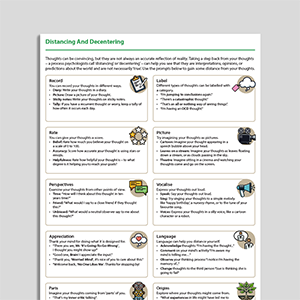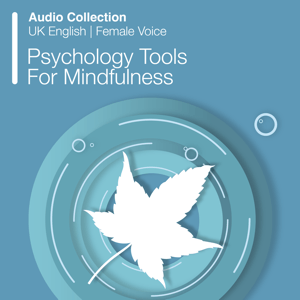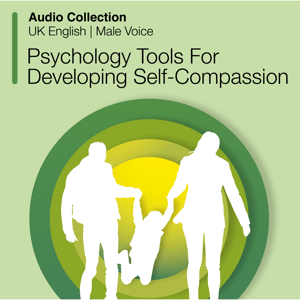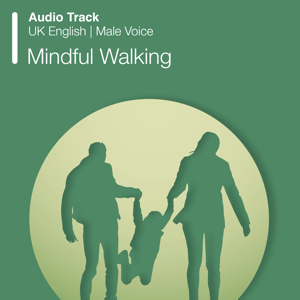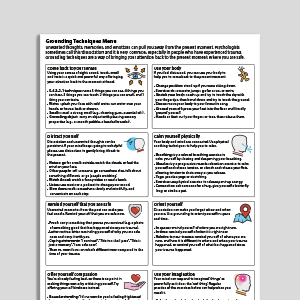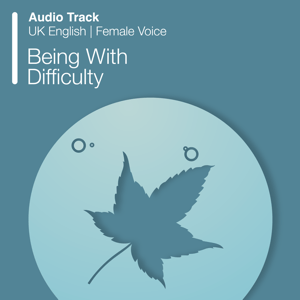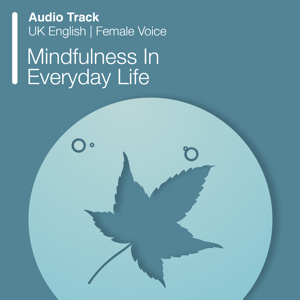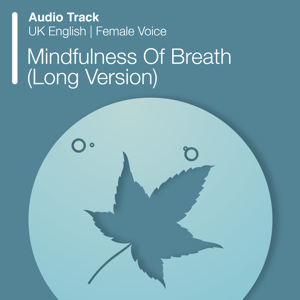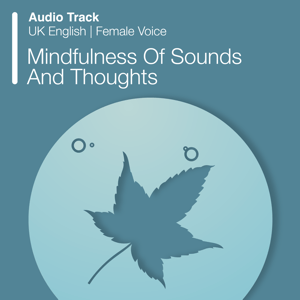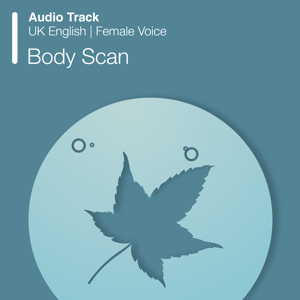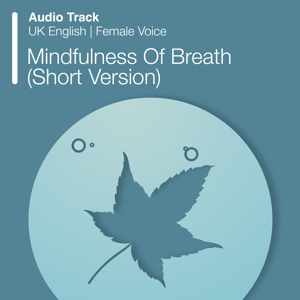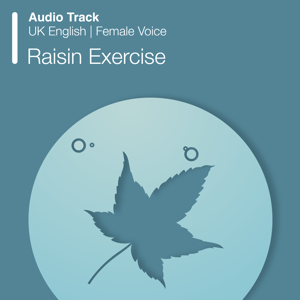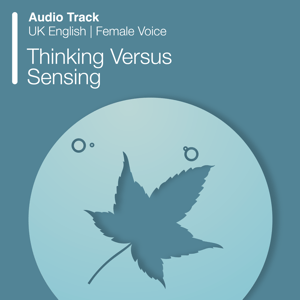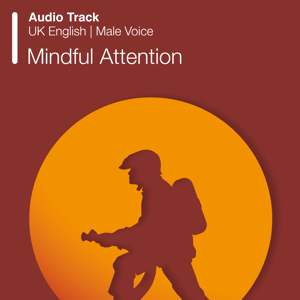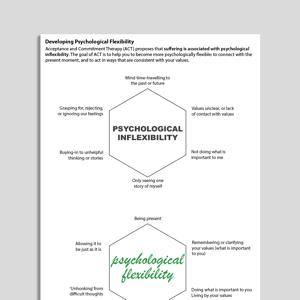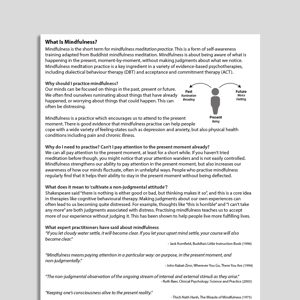Mindfulness
Within the Buddhist tradition, mindfulness is a part of the path toward understanding the nature of suffering and how to free ourselves from it. It helps us to become aware of and work with the vulnerabilities, challenges, and suffering that are part of being human (Gunaratana, 2002). Mindfulness has been defined as the awareness that emerges when we pay attention to experience on purpose, in the present moment, and nonjudgmentally (Kabat-Zinn, 1994).
Showing 1 to 16 of 16 results
Audio Collection: Psychology Tools For Mindfulness
Audio Collection: Psychology Tools For Mindfulness
Audio Collection: Psychology Tools For Developing Self-Compassion
Audio Collection: Psychology Tools For Developing Self-Compassion
Grounding Techniques Menu
Grounding Techniques Menu
Mindfulness In Everyday Life (Audio)
Mindfulness In Everyday Life (Audio)
Mindfulness Of Breath (Long Version) (Audio)
Mindfulness Of Breath (Long Version) (Audio)
Mindfulness Of Sounds And Thoughts (Audio)
Mindfulness Of Sounds And Thoughts (Audio)
Mindfulness Of Breath (Short Version) (Audio)
Mindfulness Of Breath (Short Version) (Audio)
Developing Psychological Flexibility
Developing Psychological Flexibility
Links to external resources
Psychology Tools makes every effort to check external links and review their content. However, we are not responsible for the quality or content of external links and cannot guarantee that these links will work all of the time.
Assessment
-
Five Facets Mindfulness Questionnaire
| Baer, Smith, Hopkins, Krietemeyer, Toney | 2006
- Baer, R. A., Smith, G. T., Hopkins, J., Krietemeyer, J., & Toney, L. (2006). Using self report assessment methods to explore facets of mindfulness. Assessment, 13, 27- 45.
- Scale
Exercises
- Mindfulness of walking | Project Air | 2018
- The "just worrying" labelling technique | Chris Walsh
- Mindfulness Instructions | Chris Walsh
- Body Scan Mindfulness Exercise
- Mindfulness
Guides and workbooks
- Mindfulness-based stress reduction activities workbook
Information Handouts
- The RAIN of self-compassion | Tara Brach
-
Urge Surfing
| Chris Walsh
- Teaching urge surfing to clients
- What is urge surfing?
Information (Professional)
- Mindfulness-Based Cognitive Therapy (MBCT) Implementation Resources | Kuyken, Crane, Williams | 2012
Presentations
- Mindfulness in clinical psychology | Mark Williams | 2010
- Mindfulness-based cognitive therapy | Willem Kuyken | 2013
Self-Help Programmes
-
Mindful Awareness Stabilization Training (MAST) Program
| St Michael's Hospital, Bell Mental Health Foundation
- Session 1: Mindfulness And The Window Of Tolerance (Handout)
- Session 2: Mindfulness And The Brain (Handout)
- Session 3: Mindfulness And Emotions (Handout)
- Session 4: Developing An Action Plan For Self Care (Handout)
- Mindfulness Of The Senses (Audio)
- 3 Minute Breathing Space (Audio)
- Mindfulness Of Breath (Audio)
- Mindfulness Of Sounds (Audio)
- Mindfulness Of Emotions (Audio)
- Standing Meditation (Audio)
- Compassion Meditation (Audio)
Treatment Guide
- Mindfulness and acceptance-based group therapy for social anxiety disorder: a treatment manual | Fleming, Kocovski | 2009
- Mindfulness-based approaches: a guide for psychologists | Whomsely, Russel, Agostinis, Bahu, Chapman, Clack, Clarke, Davies, Finlay, Gore, Hearn, BPS | 2022
- Mindfulness-based cognitive therapy (MBCT) implementation resources | Willem Kuyken, Rebecca Crane, Mark Williams | 2012
Recommended Reading
- Keng, S. L., Smoski, M. J., & Robins, C. J. (2011). Effects of mindfulness on psychological health: A review of empirical studies. Clinical psychology review, 31(6), 1041-1056.
- Hofmann, S. G., Sawyer, A. T., Witt, A. A., & Oh, D. (2010). The effect of mindfulness-based therapy on anxiety and depression: A meta-analytic review. Journal of consulting and clinical psychology, 78(2), 169.
- Hedman-Lagerlöf, M., Hedman-Lagerlöf, E., & Öst, L. G. (2018). The empirical support for mindfulness-based interventions for common psychiatric disorders: a systematic review and meta-analysis.Psychological medicine, 1-14.
- Goldberg, S. B., Tucker, R. P., Greene, P. A., Davidson, R. J., Wampold, B. E., Kearney, D. J., & Simpson, T. L. (2017). Mindfulness-based interventions for psychiatric disorders: A systematic review and meta-analysis.Clinical psychology review.
- Baer, Ruth A. (2003). Mindfulness training as a clinical intervention: A conceptual and empirical review.Clinical Psychology: Science and Practice, 10(2), 125-143.
What Is Mindfulness?
Crane (2017) describes three broad elements of mindfulness teaching and how, in a Buddhist context, they are taught as an integrated system that offers the potential to develop insight and new perspectives, and to foster personal transformation:the development of mindful awareness by a combination of systematic and informal practice;
an attitudinal framework characterized by kindness, curiosity, and a willingness to be present with the unfolding of experience;
a deep understanding of the nature of suffering.
References
Crane, R. (2017). Mindfulness-based cognitive therapy. CBT Distinctive Features Series. New York: Routledge.
Gunaratana, H. (2002). Mindfulness in Plain English (Revised and Expanded ed.). Boston: Widom.
Kabat-Zinn, J. (1994). Wherever you go, there you are: Mindfulness meditation in everyday life. New York: Hyperion
